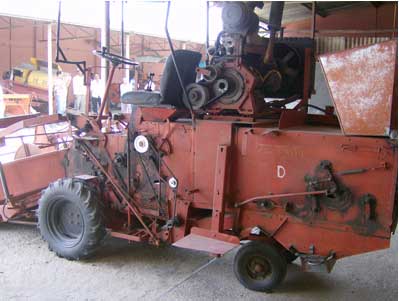Ried im Innkreis,
Austria
June 30, 2008
Last year brought lots of big
surprises for agriculture. Following the latest financial
crisis, the international stock markets and also the physical
markets are being significantly affected by substantial values.
Current reports assume that despite a record harvest in 2007 and
an associated increase in agricultural production volumes, there
is still a relative shortage of agri-cultural raw materials such
as wheat.
On one hand this accounts for the continuously rising global
demand for seed for both food and energy, which has led to
agricultural stocks being virtually used up, and on the other
side it explains why many agricultural nations such as the USA
or Kazakhstan need their production for their own requirements
and are able to export only a little or even none at all. All in
all, many experts are assuming that prices for the most
important crop varieties will remain at a high level.
Many reports in the media are currently devoted to developments
in the price of agricultural commodities. They deal with the
reasons and responsibilities for a global food crisis due to
high prices. At the same time there are frequent references to
the use of agricultural commodities for the production of
bioenergy. The flow of huge amounts of money into the
commodities exchanges is also throwing up ethical questions.
 Conversely,
it is a frequently overlooked fact that research in the field of
plant cultivation in the developing countries is carried out in
part under the most miserable conditions. While increasingly
more efficient cultivars are being bred in highly developed
countries in Europe and America and productivity is constantly
rising, research in the developing countries is practically at a
standstill. Nowadays, challenges such as climate change and the
growing demand for commodities are shaping the landscape. More
importantly, rising prices ought really to be incentive enough
to encourage work on the productivity of new cultivars. Many
countries import what they lack to supply the population. This
dependency on exporting countries goes well as long as the major
exporters of agricultural commodities have sufficient volumes
available for export, which these days is often no longer the
case. All of this underlines the need for professional research
and testing of cultivars in order to meet these challenges. Conversely,
it is a frequently overlooked fact that research in the field of
plant cultivation in the developing countries is carried out in
part under the most miserable conditions. While increasingly
more efficient cultivars are being bred in highly developed
countries in Europe and America and productivity is constantly
rising, research in the developing countries is practically at a
standstill. Nowadays, challenges such as climate change and the
growing demand for commodities are shaping the landscape. More
importantly, rising prices ought really to be incentive enough
to encourage work on the productivity of new cultivars. Many
countries import what they lack to supply the population. This
dependency on exporting countries goes well as long as the major
exporters of agricultural commodities have sufficient volumes
available for export, which these days is often no longer the
case. All of this underlines the need for professional research
and testing of cultivars in order to meet these challenges.
In most of the developing countries, research and development is
carried out through state-financed institutes. The experience
gained by WINTERSTEIGER, whose employees are also regularly
travelling in developing countries, shows that most of the
developing countries in Asia and Africa have either no or very
antiquated sowing, harvesting and laboratory technology
available to research and test cultivars. India's state-run
research centre in New Delhi (IARI), for example, has 25-year
old plot combines that no longer permit accurate results.
So does this crisis not also create a huge opportunity? In our
opinion, a way out of the global food crisis much reported at
present must inevitably touch on the professional research and
development of seed. Furthermore, we hope that organisations
such as the WTO and FAO will devote themselves seriously to this
topic in the future and support developing countries in building
up their research and development.
WINTERSTEIGER AG is a special machine constructor from Upper
Austria and has concentrated on niche markets since its
establishment in 1953. Today WINTERSTEIGER is a global market
leader in each of its three business divisions:
- Division SEEDMECH: Total solutions for agricultural field
experiments
- Division SPORTS: Total solutions for the rental and servicing
of skis and snowboards
- Division WOODTECH: Total solutions for precise thin-cutting of
wood
WINTERSTEIGERís Division
SEEDMECH provides solutions for the entire process of
agricultural field experimentation. This enables the research,
breeding, testing and seed increases of agricultural crops and
special crops at the highest level. The product range covers
plot combines, plot seeders, laboratory equipment and equipment
for fertilising and plant protection.
Headquarters in the Upper Austrian town of Ried/Innkreis, 16
proprietary company sites and 60 subsidiary offices supply a
total of 130 countries throughout the world. This secures
WINTERSTEIGER an export share of approximately 88%. Group sales
of the enterprise, which employs around 600 staff, were just
short of EUR 85 million in 2007. |
|